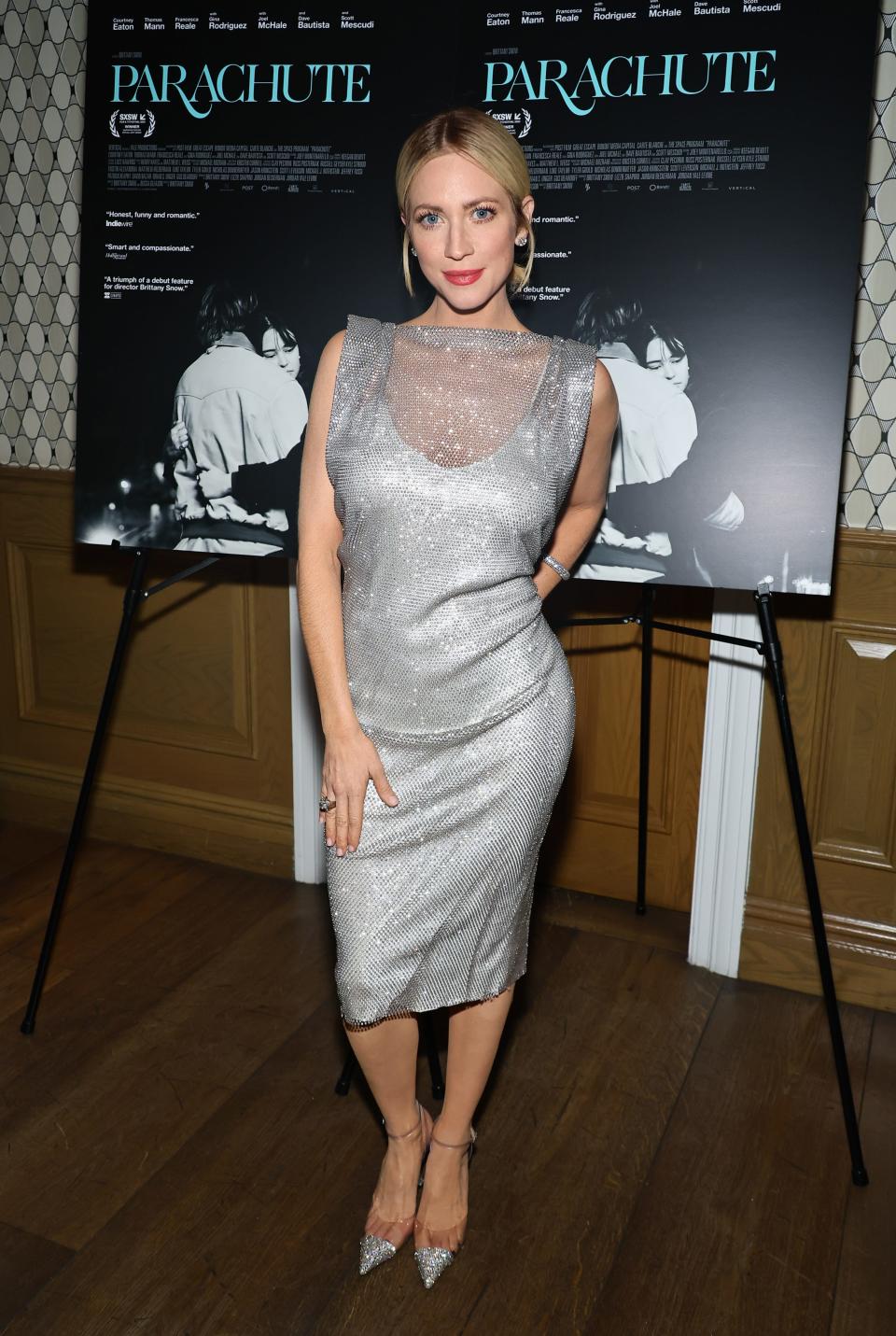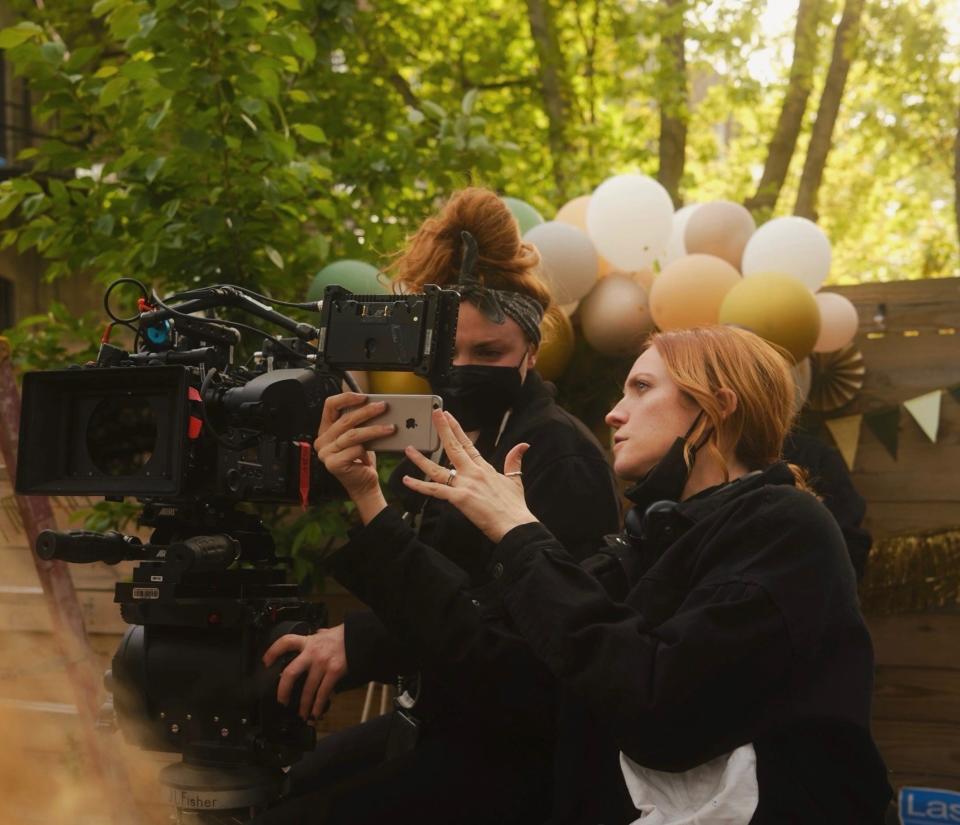Brittany Snow's directorial debut shows us to let go of our 'Parachute'
- Oops!Something went wrong.Please try again later.
- Oops!Something went wrong.Please try again later.
Brittany Snow's directorial debut "Parachute" is a film about love, but the audience never sees the moment when the protagonists, Riley and Ethan, say "I love you" to each other for the first time.
Instead, the characters say the phrase at the end of a phone call. The utterance is so subtle it could be easy to miss. But the words are significant because the viewer learns these strangers who met at a mutual friend's party and went on a spontaneous dinner date are suddenly very, very important to one another.
The omission of a grand "I love you" declaration between these unexpected soulmates was intentional, Snow tells USA TODAY.
"They jump steps," the "Pitch Perfect" star says. "I wanted to shake the audience and show these people are not living the ABC of a relationship. They're using each other in a way that's self-soothing, but it's not necessarily intimate."

In "Parachute" (in select theaters now, available on demand Friday), Riley (Courtney Eaton) is in recovery from an eating disorder and other forms of addiction while Thomas Mann's Ethan is a once-promising musician trained since his childhood with an alcoholic father (Joel McHale) to pick up the pieces for those he loves.
The strangers leap to lovers in the film, but not the typical rom-com kind of lovers. Their love is co-dependent: Riley and Ethan need each other to soften their respective pains. They are, in a sense, one another's "parachutes," Snow says. Holding on to each other − even at the expense of admitting their own faults − makes experiencing the hard parts of life easier.
Snow's "Parachute," which she co-wrote with Becca Gleason, is a disordered film about disordered life. The film is influenced by Snow's own recovery process from an eating disorder and a friendship, "the real Ethan to me," that defined that period of her life.

The timeline of the film is intentionally broken because "recovery is not a linear process," Snow says. "It's really important to tell that when you're acting out in your addiction, it's also tied to the past."
Riley acts out in her disease because she's processing past trauma in an unhealthy way, Snow says. For example, the hurt of a cheating ex-boyfriend manifests in the way she listens to voicemails from him while she engages in urgent exercise.
On the outside, Riley and Ethan's relationship seems pretty great, almost attractive. Snow purposely curated reels of photographs of the characters having Instagram-worthy double dates with their friends, played by Francesca Reale and Scott Mescudi (aka Kid Cudi), to prove this point. But just as the initial dopamine hit of scrolling Instagram fades, the rush of joy the characters feel at their bond fades as their co-dependency grows.

While Riley is in her disorder, Ethan sits in his own denial, a relationship depicted in a climactic shot in which Ethan is happy to lie in a fairy-lit child's fort he built for Riley while she furiously pedals on an exercise bike in the same room. His complacency with her compulsory exercise is shaped by a life of believing he can heal those hurting around him. But this fantasy comes at the expense of a better relationship with himself and others.
"That wide shot is something I had planned in my head even when writing, because that juxtaposition in totality summed up the movie," Snow says. "Ethan is not seeing the full picture of letting her go. ... That is a child-like mentality, that 'I can help you, I can control this, and if you just let me, you'll be OK.' "

While the film opens with Riley being discharged from a rehabilitation clinic, the movie never veers into clinical eating disorder depictions. Instead, Snow demonstrates how an eating disorder presents itself in life, haunting the present with past pain that manifests as self-hatred.
Montages of necklines, knees, elbows and legs highlight how Riley is clocking other women's bodies, her mind constantly comparing. This persistent looking is amplified as Riley scrolls Instagram, taking in every virtual body, and repeatedly deleting and reloading the app. And while Riley gets a seemingly stable hosting job at a cabaret club (with Dave Bautista playing a lovable boss named Bryce), the portrayal of her interior life shows how precarious recovery can be as she slips into her disease at home like a pair of comfortable sweatpants.
"This is a description of eating disorder, body dysmorphia and co-dependence, it's not a solve or an answer," Snow says. "I don't know what the answer is, other than people watching this and feeling less alone."
Snow partnered with the National Alliance for Eating Disorders to prepare resources about the film's content.
The audience is also met with the perplexity of recovery when Riley announces to her therapist, played by an endearing Gina Rodriguez, that she "hates therapy." Shouldn't someone in so much pain love feeling better?
The audience can sit with Riley on the couch − talking about the worst bits of ourselves is the hardest thing anyone can do, Snow says.
From drugs to food to sex to people, everyone uses "parachutes" to lessen the blow of life, Snow says. The film's titular metaphor is especially salient in a scene in which Ethan implores Riley not to look at herself through a mirror but through his eyes, something many people told Snow during her own recovery. Snow says she found this sentiment held her back − she needed to feel her own feelings. And, as Riley eventually learns, to want to get better.
"I needed to look at myself, and I needed to fall," Snow says. "It's no one's job to be this 'parachute.' "
If you or someone you know has an eating disorder, contact the National Alliance for Eating Disorders free helpline at (866) 662-1235.
Learn more about the signs and experiences of having an eating disorder here.
This article originally appeared on USA TODAY: Brittany Snow's 'Parachute' starring Courtney Eaton teaches letting go

